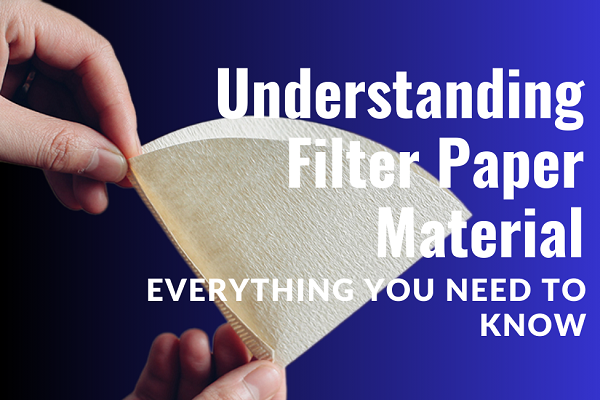
Filter paper material is an essential component used in a variety of industries such as food and beverage, pharmaceutical, chemical, and environmental. It is a specialized porous material that allows the separation of solids from liquids or gases. Often overlooked, the quality and type of filter paper material can greatly impact the efficiency and effectiveness of the filtration process. In this blog, we will dive deeper into the world of filter paper material to help you understand its importance and benefits.
What is Filter Paper Material?
Filter paper material is made up of cellulose fibers that form a porous matrix. These fibers are derived from sources such as wood pulp, cotton, and other synthetic materials. The fibers are bonded together to create a thin and uniform sheet with tiny pores that allow the passage of liquid or gas while retaining solid particles. Different types of filter paper materials are available in the market, each with specific properties and advantages.
Different Types of Filter Paper Material:
1. Cellulose Filter Paper:
As the most commonly used filter paper material, cellulose filter paper is made from pure cellulose fibers. It is the go-to choice for general laboratory use and can effectively filter out large particles. However, it is not resistant to strong acids and bases.
2. Glass Fiber Filter Paper:
Made from borosilicate glass microfibers, this type of filter paper material has a high flow rate and can withstand extreme temperatures and corrosive chemicals. It is often used in industries where higher levels of purification are required.
3. Nylon Filter Paper:
Made from nylon fibers, this material is hydrophobic, meaning it repels water and allows for the filtration of organic solvents and aggressive acidic or alkaline solutions.
4. Syringe Filter Paper:
This type of filter paper material is used for small-scale filtration and is commonly used in medical and pharmaceutical applications. They are made with polyethersulfone (PES), nylon, or glass fibers and are available in different pore sizes for finer filtration.
Benefits of Using High-Quality Filter Paper Material:
1. Improved Filtration Efficiency:
The use of high-quality filter paper material ensures the removal of even the tiniest particles, resulting in a more efficient and effective filtration process.
2. Chemical Compatibility:
Choosing the right filter paper material with the appropriate chemical compatibility is crucial. It ensures that the filter paper will not disintegrate or react with the filtered substance, resulting in a pure and uncontaminated end product.
3. Cost-Effective:
Investing in good quality filter paper material may seem like an added expense, but it can save you money in the long run. High-quality filter paper can last longer and requires less frequent replacement, thus reducing overall costs.
4. Consistent Results:
The consistency and uniformity of filter paper material play a significant role in the filtration process. It ensures that the filtration process is precise and reproducible, providing consistent results every time.
5. Eco-Friendly:
Filter paper material is biodegradable, making it an environmentally friendly option for filtration. Unlike other materials that may leave behind harmful residues, filter paper can be disposed of safely.
Applications of Filter Paper Material:
1. Laboratory Filtration:
Filter paper material is widely used in laboratories for various purposes, such as separating solids from liquids, filtering out impurities, and determining the particle size of a substance.
2. Food and Beverage Industry:
In the food and beverage industry, filter paper material is used for clarifying, sterilizing, and degreasing liquids such as juices, milk, and beer.
3. Water Treatment:
Water treatment plants use filter paper material to remove impurities and contaminants from water, making it safe for consumption.
4. Pharmaceutical Industry:
Filter paper material is an essential component in the production of medicines and vaccines. It helps to remove impurities and ensures the purity and potency of the final product.
Conclusion:
Filter paper material is an integral part of the filtration process and choosing the right type of material is vital for achieving desired results. In this blog, we have discussed different types of filter paper material, their benefits, and applications. We hope this has given you a better understanding of filter paper material and its significance in various industries. So, the next time you are in need of filter paper, remember to consider the quality and type of filter paper material to ensure efficient and precise filtration.


